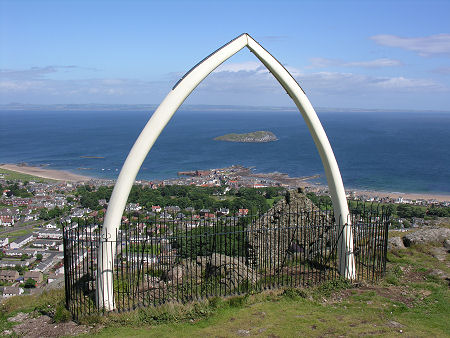 North Berwick: John Mair Was Born Nearby |
John Mair lived from 1467 to 1 May 1550. Also known as John Major, Joannes Majoris and Haddingtonus Scotus, he was a Scottish philosopher widely regarded in his day and highly influential on the generations who followed him. He was also an active academic, serving as Principal of the University of Glasgow and Provost of St Salvator's College, part of the University of St Andrews. The wider picture in Scotland at the time is set out in our Historical Timeline.
John Mair was born near North Berwick in East Lothian and attended the grammar school in Haddington. He lived in the area until 1490 when, at the age of 22, he left for Paris. He seems not to have attended any of Scotland's universities, but en route to Paris spent a year studying at Christ's College, Cambridge. In 1493 he became a student at the Collège Sainte-Barbe, part of the University of Paris, where he gained his Bachelor of Arts in 1495 and his Master's degree the following year. Despite a serious illness in 1497, Mair began to study theology at the College of Navarre in 1499, receiving his Bachelor of Theology degree in 1501.
In 1505 a collection of his philosophical writings was published, and the following year he was awarded his Doctor of Divinity degree and licenced to teach theology. He went on to teach at the Collège de Montaigu and at the Sorbonne. From 1510 he began to give lectures and publish papers discussing the moral and legal questions arising from the Spanish conquest of America. His ideas at the time were revolutionary, and included the assertion that indigenous peoples had political and legal rights.
In 1518 Mair returned to Scotland to take up the post of Principal of the University of Glasgow, having declined an offer from the English Cardinal Wolsey of a post at what became Christ Church, Oxford. During this period he seems to have travelled frequently between Scotland and Paris. In 1528, King Francis I of France granted John Mair French citizenship. In 1533 he was appointed to the post of Provost of St Salvator's College, part of the University of St Andrews.
John Mair died in 1550 at the advanced age of 83. His views on the structure of language were to influence generations of later philosophers including the likes of Thomas Reid and other key players in the Scottish Enlightenment. His views on the rights of indigenous peoples resulted in early (but ill enforced) changes to Spanish law and are often seen as the first step in the later development of human rights law. His theological views tended to be swept aside, at least in Scotland, by the Reformation of 1560: amongst his students at St Andrews was John Knox.
